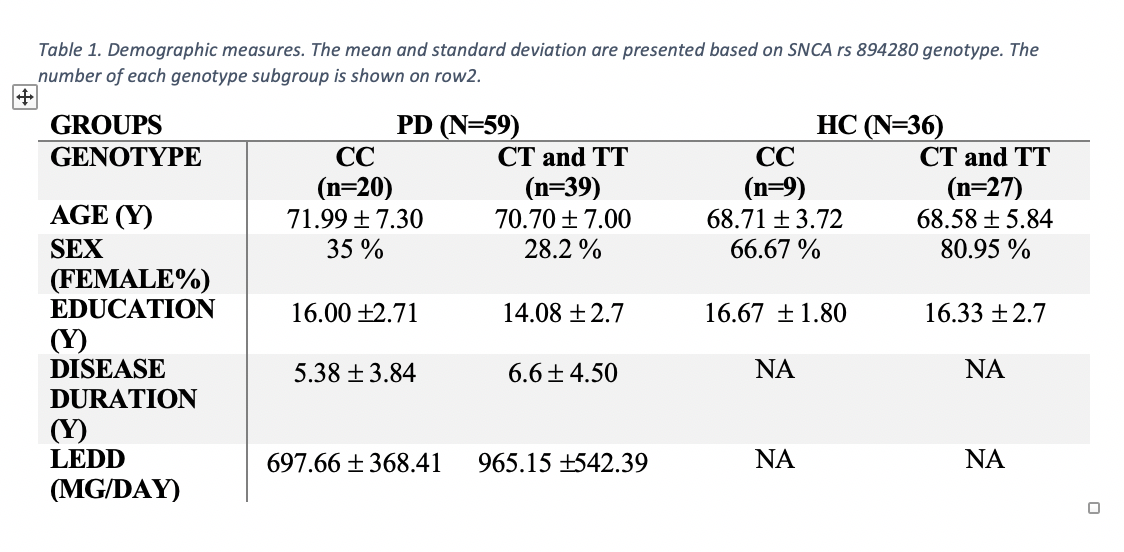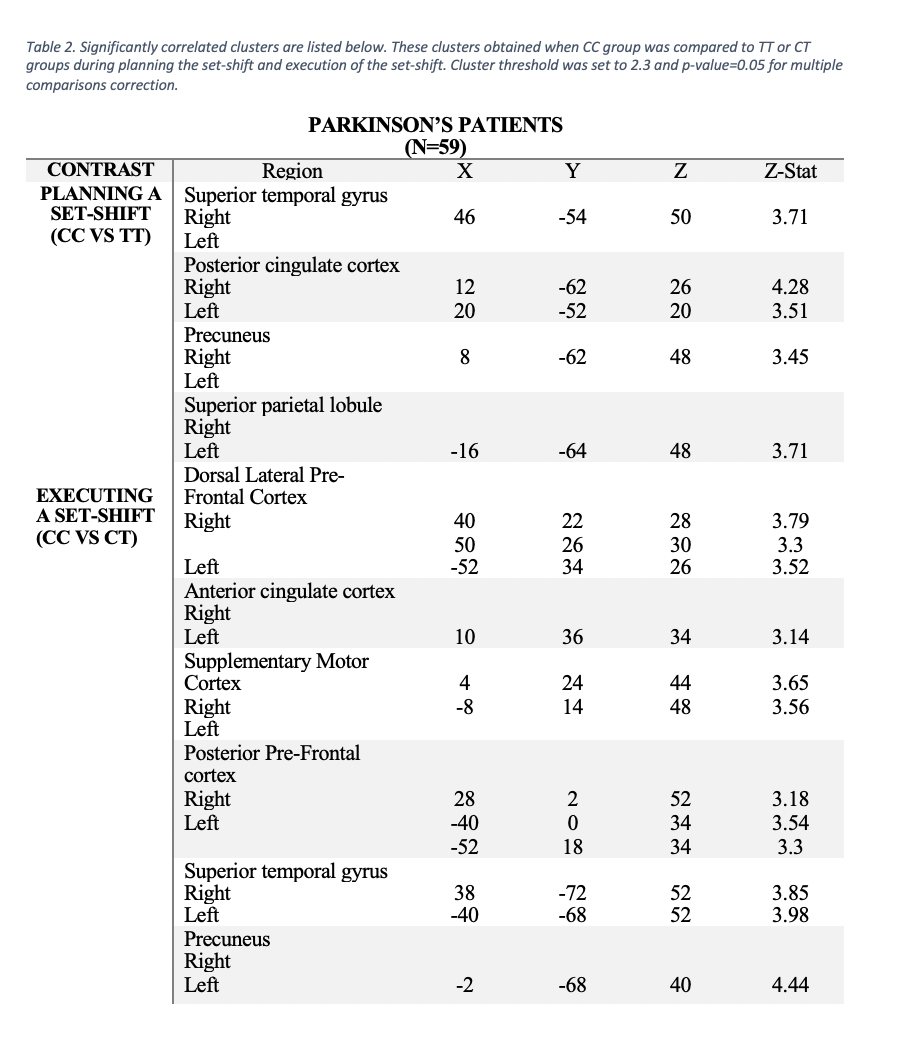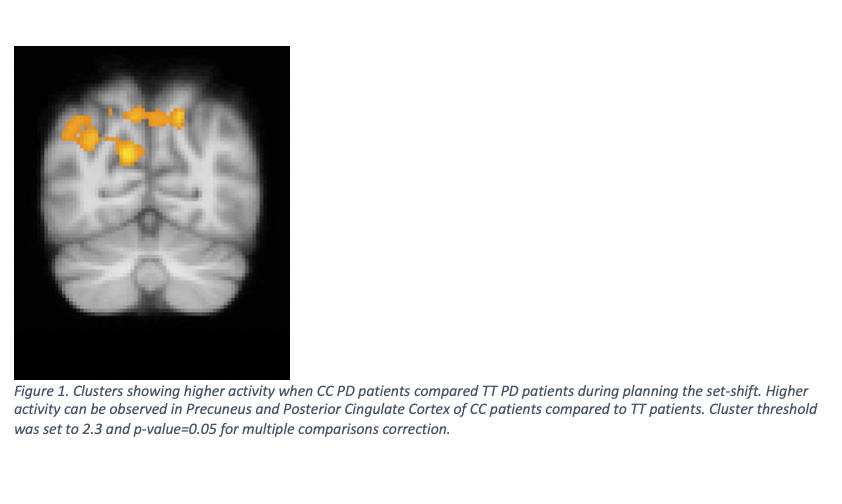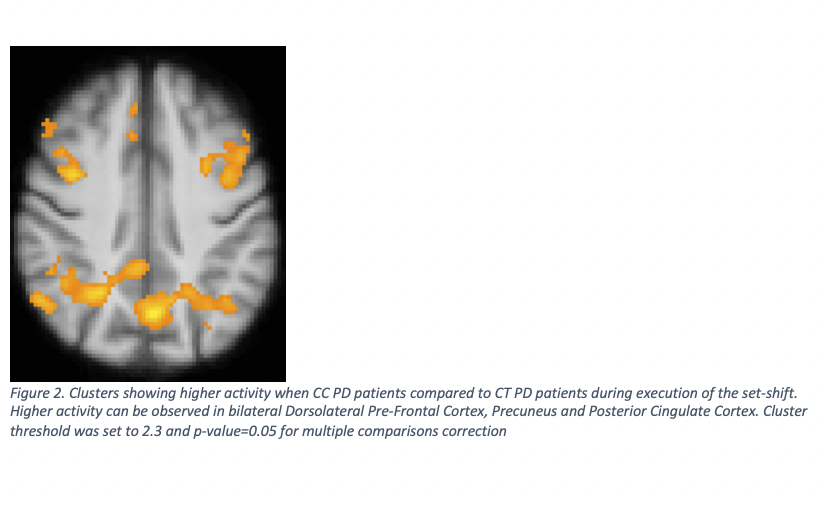Session Information
Date: Wednesday, September 25, 2019
Session Title: Cognition and Cognitive Disorders
Session Time: 1:15pm-2:45pm
Location: Agora 3 East, Level 3
Objective: To assess the effect of rs894280 of Sybnuclein-alpha (SNCA)gene on cognitive profile of idiopathic Parkinson’s disease (PD) patients and patterns of neuronal activity during a set-shifting task
Background: SNCAgene is a prominent causative factor in familial PD but recent studies showed specific variation (e.g. rs 894280) associated with cognitive impairment in idiopathic PD (1).
Method: 97 participants were recruited including 60 PD patients (Hoehn & Yahr stage II/III) and 37 age-matched neurologically Healthy Controls (HC). Genotyping was performed by TaqMan assay (8933128-10). All participants had a full assessment of the five main cognitive domains (executive-function, language, memory, attention and visuo-spatial). Each individual had one structural and functional MRI scan in a 3T GE scanner. During the scan participants completed three runs of the Wisconsin-Card-Sorting-Task (WCST). fMRI data was analyzed using FSL.
Results: Demographics data of participants are shown in (table 1). Regression test showed a significant association between the major allele (CC) and average z-scores of the following cognitive domains in the PD group: memory (n=59, R=0.302, p=0.02), and attention (n=59, R=0.289, p=0.027). Homozygous-CC patients had a significant trend for higher MoCA scores compared to T positive patients (n=59, Mann-Whitney U test=272.00 significance-level=0.057). No significant association was found for cognitive data in HC. Homozygous-CC patients showed higher activity during planning a set-shift in Posterior Cingulate, Precuneus and Superior Temporal regions compared to homozygous-TT patients (figure1). During set-shifting homozygous-CC patients showed higher activity than heterozygous carriers in bilateral Dorsolateral Pre-Frontal Cortex, Precuneus and Posterior Cingulate Cortex (figure2 and table2). These results reflect previously reported differences between patients with Mild Cognitive Impairment (PD-MCI) and patients without Mild Cognitive Impairment (PD-nonMCI). Intragroup analysis showed a trend for lower activity during WCST as the number of C alleles was reduced (CC>CT>TT) but the number of participants per group was not equal.
Conclusion: SNCArs894280 has a specific impact on attention, memory, and neuronal activity during executive processes in PD patients but this is not the same for HC. Further studies with increased participant numbers are necessary to validate these results.
References: 1-Guella I, Evans DM, Farrer MJ, et al. (2016) α-synuclein genetic variability: A biomarker for dementia in Parkinson disease. Annals of Neurology. 79(6) 991-999.
To cite this abstract in AMA style:
O. Monchi, JR. Sarna, D. Martino, Z. Gan-Or, JA. Ruskey, T. Alrazi, A. Robichaud, T. Hammer, ST. Lang, J. Cheetham, E. Yoon, M. Kibreab, I. Kathol, JS. Provost, M. Ramezani. Synuclein-alpha´s variant, rs 894280 shows association with memory and attention in PD patients [abstract]. Mov Disord. 2019; 34 (suppl 2). https://www.mdsabstracts.org/abstract/synuclein-alphas-variant-rs-894280-shows-association-with-memory-and-attention-in-pd-patients/. Accessed December 23, 2025.« Back to 2019 International Congress
MDS Abstracts - https://www.mdsabstracts.org/abstract/synuclein-alphas-variant-rs-894280-shows-association-with-memory-and-attention-in-pd-patients/




